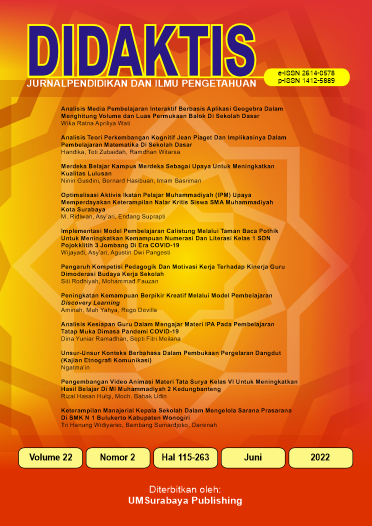Optimalisasi Aktivis Ikatan Pelajar Muhammadiyah (Ipm) Upaya Memperdayakan Keterampilan Nalar Kritis Siswa Sma Muhammadiyah Kota Surabaya
Abstrak
ABSTRAK
Penelitian ini bertujuan dalam rangka meningkatkan kemampuan berfikir kritis dan keterampilan proses belajar mengajar siswa kelas 10 dan 11 MIA SMA Muhammadiyah 10 Surabaya. Penelitian ini merupakan penelitian kualitatif. Subjek penelitian adalah siswa kelas 10 MIA dan 11 MIA SMA Muhammadiyah 10 Surabaya tahun pelajaran 2019/2020 dengan jumlah 28 siswa dan 15 siswa. Penelititian dilakukan selama satu kali siklus. Data penelitian terdiri atas hasil observasi keterlaksanaan pembelajaran,hasil tertulis dan kemampuan berfikir kritis. Data dianalisis secara deskriptif kualitatif. Hasil penelitian menunjukan bahwa siswa siswi yang aktif berorganisasimemiliki nilai tersendiri dimata guru dan kemampuan nalarnya melalui tingkat kritis dalam menanggapi masalah didukung dengan adanya organisasi Ikatan Pelajar Muhammadiyah (IPM) siswa kelas 10 dan 11 MIA SMA Muhammadiyah 10 Surabaya.
Katakunci : aktivis IPM, nalar kritis, siswa
ABSTRACT
This research is in the context of improving critical thinking skills and teaching and learning process skills of 10th and 11th grade students of Muhammadiyah senior high school of Surabaya. This research is a cualitative research and interview. The subjects of the study were students of grade 10 in mathematics and natural sciences and students of grade 11 in mathematics and natural sciences at Muhammadiyah senior high school of Surabaya in 2019/2020 with a total of 28 students and 15 students. The study was conducted for one cycle. The research data consisted of observations of the implementation of learning, written results and the ability to think critically. Data was analyzed descriptively qualitatively. The results showed that students who actively organize had their own values in the eyes of teachers and their ability to reason through a critical level in responding to problems supported by the organization of Muhammadiyah student associations of 10th and 11th grade students in mathematics and natural science at Muhammadiyah senior high school of Surabaya.
Keywords: IPM activists, critical reasoning, studentsArtikel teks lengkap
Referensi
Akpur, U. (2020). Critical, Reflective, Creative Thinking and Their Reflections on Academic Achievement. Thinking Skills and Creativity, 37(May). https://doi.org/10.1016/j.tsc.2020.100683
Bai, S., Hew, K. F., & Huang, B. (2020). Does gamification improve student learning outcome? Evidence from a meta-analysis and synthesis of qualitative data in educational contexts. Educational Research Review, 30(June 2019), 100322. https://doi.org/10.1016/j.edurev.2020.100322
Chan, Z. C. Y. (2019). Nursing students’ view of critical thinking as ‘Own thinking, searching for truth, and cultural influences.’ Nurse Education Today, 78(January), 14–18. https://doi.org/10.1016/j.nedt.2019.03.015
Chen, I. C., Hwang, G. J., Lai, C. L., & Wang, W. C. (2020). From design to reflection: Effects of peer-scoring and comments on students’ behavioral patterns and learning outcomes in musical theater performance. Computers and Education, 150(August 2019), 103856. https://doi.org/10.1016/j.compedu.2020.103856
D’Alessio, F. A., Avolio, B. E., & Charles, V. (2019). Studying the impact of critical thinking on the academic performance of executive MBA students. Thinking Skills and Creativity, 31(January), 275–283. https://doi.org/10.1016/j.tsc.2019.02.002
Efendi, P. D. (2020). KEILMUAN.
El Soufi, N., & See, B. H. (2019). Does explicit teaching of critical thinking improve critical thinking skills of English language learners in higher education? A critical review of causal evidence. Studies in Educational Evaluation, 60(November 2018), 140–162. https://doi.org/10.1016/j.stueduc.2018.12.006
Fitria. (2013). 済無No Title No Title. Journal of Chemical Information and Modeling, 53(9), 1689–1699.
Gatti, L., Ulrich, M., & Seele, P. (2019). Education for sustainable development through business simulation games: An exploratory study of sustainability gamification and its effects on students’ learning outcomes. Journal of Cleaner Production, 207, 667–678. https://doi.org/10.1016/j.jclepro.2018.09.130
Gerritsen-van Leeuwenkamp, K. J., Joosten-ten Brinke, D., & Kester, L. (2019). Students’ perceptions of assessment quality related to their learning approaches and learning outcomes. Studies in Educational Evaluation, 63(July 2018), 72–82. https://doi.org/10.1016/j.stueduc.2019.07.005
Huizenga, J., Admiraal, W., Dam, G. ten, & Voogt, J. (2019). Mobile game-based learning in secondary education: Students’ immersion, game activities, team performance and learning outcomes. Computers in Human Behavior, 99(April), 137–143. https://doi.org/10.1016/j.chb.2019.05.020
Hyytinen, H., Toom, A., & Postareff, L. (2018). Unraveling the complex relationship in critical thinking, approaches to learning and self-efficacy beliefs among first-year educational science students. Learning and Individual Differences, 67(August), 132–142. https://doi.org/10.1016/j.lindif.2018.08.004
Ismail, N. S., Harun, J., Zakaria, M. A. Z. M., & Salleh, S. M. (2018). The effect of Mobile problem-based learning application DicScience PBL on students’ critical thinking. Thinking Skills and Creativity, 28, 177–195. https://doi.org/10.1016/j.tsc.2018.04.002
Kaya, H., Şenyuva, E., & Bodur, G. (2018). The relationship between critical thinking and emotional intelligence in nursing students: A longitudinal study. Nurse Education Today, 68, 26–32. https://doi.org/10.1016/j.nedt.2018.05.024
Knoop-van Campen, C. A. N., Segers, E., & Verhoeven, L. (2020). Effects of audio support on multimedia learning processes and outcomes in students with dyslexia. Computers and Education, 150(June 2019), 103858. https://doi.org/10.1016/j.compedu.2020.103858
Ku, K. Y. L., Kong, Q., Song, Y., Deng, L., Kang, Y., & Hu, A. (2019). What predicts adolescents’ critical thinking about real-life news? The roles of social media news consumption and news media literacy. Thinking Skills and Creativity, 33(January), 100570. https://doi.org/10.1016/j.tsc.2019.05.004
Lee, Y. L. (2018). Nurturing critical thinking for implementation beyond the classroom: Implications from social psychological theories of behavior change. Thinking Skills and Creativity, 27(February), 139–146. https://doi.org/10.1016/j.tsc.2018.02.003
Liu, F., & Stapleton, P. (2018). Connecting writing assessment with critical thinking: An exploratory study of alternative rhetorical functions and objects of enquiry in writing prompts. Assessing Writing, 38(November 2017), 10–20. https://doi.org/10.1016/j.asw
Penulis
Hak cipta berada di tangan penulis
Artikel yang terbit dapat digunakan di bawah lisensi Creative Commons Attribution-NonCommercial 4.0 International License.


